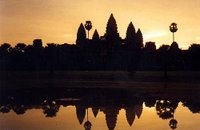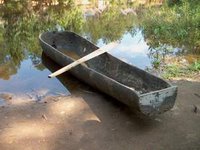Cambodia’s Failing Democracy
2 Comments Published by seserak on Tuesday, January 24, 2006 at 6:57 PM.As the Cambodian experience makes clear, democracy is not synonymous with holding elections. Well-run elections are a peaceful, efficient means to allocate power and authority. But one election, or even many elections, does not necessarily a democracy make. The essence of Western democracy consists of a separation of powers with checks and balances within a system of democratic institutions, political parties, and free elections. The Cambodian elite has yet to embrace central elements of this process, like power sharing, dissent, and loyal oppositionThe complete article is here: Cambodia’s Failing Democracy
St Johnan is the author of Revolution, Reform, and Regionalism in Southeast Asia: Cambodia, Laos, and Vietnam (Routledge 2006). The book's title alone sounds interesting enough. I thought I was going to order the book from Amazon. But I was upset when I checked the price. It costs more than 100 bucks. I'm wondering why it has to be that expensive.
Picture of the Day: My Little Cousin
3 Comments Published by seserak on Monday, January 23, 2006 at 11:03 PM. Looking at the pictures of the famous Angkor Wat temple taken from the far front, I notice a few tall palm trees emerging from within the temple's ground. For me, these uniquely looking trees seem to add up to the beauty of the temple. Without them, Angkor Wat would appear rather lonely.
Looking at the pictures of the famous Angkor Wat temple taken from the far front, I notice a few tall palm trees emerging from within the temple's ground. For me, these uniquely looking trees seem to add up to the beauty of the temple. Without them, Angkor Wat would appear rather lonely.Its unique look is probablly another reason why Palm tree was named national tree of Cambodia, besides the enormous role it plays on the life of Cambodian people( as described by Wanna).
In my comment section, Beth asked me if I have any fond memories of Palm trees. I guess I have a lot to tell her. Well, talking about it reminds me of Palm juice, Palm wine, Palm Boat and a scorpion living in a palm tree.
When I was a kid, my grandfather used to climb palm trees to tap palm juice and sometimes to harvest palm fruits. At that time there were four palm trees behind his house. He didn't grow them. They were there long before he settled in.( In 1979, shortly after the collapse of the Pol Pot regime, he moved in to that new land, which was once a rice field). Unfortunately, today only one remains.
I remember sitting on a chair a long with my other relatives waiting to drink the juice once he got back to the ground. The trees were really tall and I was wondering how he could make it to the top. I once attemped to climb one of the trees but could barely make to half of the way.
I liked Palm juice and still like it . They are naturally sweet and tasty. Usually, palm trees grow on arid and infertile land. So sometimes it makes me wonder how they manage to produce such tasty juice.
Traditional palm wine is also nice. It got me drunk once or twice. Though I am not really a big fan of it. It taste like cocktail: sweet and and sour. Because it's sweet, you can easily drink a large amount of palm wine at your first try. But remember it also can make you pass out easily.
 Palm boat is just another memory. Paml boat is a small boat that is made entirely from Palm tree. I remember riding on it a couple of times. But my best memory of palm boat went back to 1991, when the biggest flood in four or five decades hit my province and most parts of Cambodia. My house, like many others, went under water. Sitting on a friend's palm boat, watching my house and the entire village turning into a huge lake was an unforgettable experience.
Palm boat is just another memory. Paml boat is a small boat that is made entirely from Palm tree. I remember riding on it a couple of times. But my best memory of palm boat went back to 1991, when the biggest flood in four or five decades hit my province and most parts of Cambodia. My house, like many others, went under water. Sitting on a friend's palm boat, watching my house and the entire village turning into a huge lake was an unforgettable experience.Lastly Palm tree reminds me of a scorpion and my cousin. You might wonder what scorpion has to do with my memory about Palm Tree. I don't really remember that myself because it happened when I was quite young. But my grandfather does, and he likes to recount the story.
He said when I was 3 or 4, my dad would drop me at his house before going to work. In the morning, as usual, he would climb the palm trees and brought back palm juice. Me and my cousin would wait for the "sweet water". One day while he was on top of the tree, he saw a white scorpion falling to the ground. He cried out from the top of the tree warning us that a scorpion had just fallen down and told us to be careful.
 Me and my cousin never saw a scorpion before. We thought it was beautiful. We suddently wanted to hold it. I said it was mine. He said it was his. We then started chasing after the poor, frightening scorpion. He was faster. He grabbed the scorpion and cheerily said:" I've got it. I've got it!" I was quite upset. He got the scorpion and one second later he was stung. He threw away the little insect and cried.
Me and my cousin never saw a scorpion before. We thought it was beautiful. We suddently wanted to hold it. I said it was mine. He said it was his. We then started chasing after the poor, frightening scorpion. He was faster. He grabbed the scorpion and cheerily said:" I've got it. I've got it!" I was quite upset. He got the scorpion and one second later he was stung. He threw away the little insect and cried.My grandfater got back from the tree a little too late. My cousin continued to cry untill the pain'd gone. Untill today I still tease him about the scorpion story.
And that's all for the memories of palm trees...
Wanna's Diary and Cambodia4kids.org
1 Comments Published by seserak on Sunday, January 08, 2006 at 5:17 AM. Wanna has just posted an interesting article about palm tree:
Wanna has just posted an interesting article about palm tree:Check out his blog for the rest of the article.For long, the Khmer has adopted the thought that "where there're palm trees, where the Khmer territory is" - it's the symbol of Cambodia. It also plays an important role in Cambodian daily life.
There're many products made of palm tree - its leaf can be used as the house's roof(still ubiquitous in countryside), its column used to support the house's loads, its crop as dessert, food in Khmer soup(called Samlaw Kaw Ko), and most remarkably, its syrup is used to produce "sugar palm tree" (technically called Borassus flabellifer) and a delicious "soft drink", or even a kind of wine "sour nectar".
Meanwhile, Beth Kanter has just recommended a Cambodian blog for those who are looking for authentic recipies for Khmer food. Also, she's been following the recent political development in Cambodia for a while. And yet you can find many other interesting posts at her site .
An Unpleasant New Year Gift
5 Comments Published by seserak on Tuesday, January 03, 2006 at 8:47 PM.Cambodia seems to enjoy making unpleasant headlines regardless of what occasion.
While many countries in the world were celebrating New Year’s Eve, the Cambodian government decided to arrest two human right activists - one of whom was Mr. Kem Sokha, president of the Cambodian Center for Human Rights and one of the most the prominent critics of the government.
On the first day of the year 2006 his arrest was in the headlines of most sites that offer news related to Cambodia. It was an unpleasant and unwanted New Year gift for those-including me- who were expecting to read something fun from Cambodia on the supposed-to-be a joyous day. So when the headline came we were really very upset. We started to wonder if this is a bad omen for the future of freedom of speech in Cambodia-and the future of democracy as a whole.
Logically speaking, if Kem Sokha’s arrest is a bad omen, it isn’t the beginning. The first bad omen began two months earlier, when another two of the most prominent government critics, Mr. Mam Sonando, owner of Beehive Radio, and Mr Rong Chhon, leader of The Cambodian Teacher Association were arrested; and many others, including opposition leader, Mr. Sam Rainsy, were forced to live in self-exile, fearing of similar arrests should they remain in the country. This is not to mention the jailing of Mr. Cheam Channy, a parliamentarian from the opposition party.
In short, 2005 was an unfortunate year for the fierce critics of the government. This raises one question: who will be next in the year 2006? If all these critics who are quite well-known to international community can be easily arrested and sent to the Prey Sar prison, there is little hope that the government will spare other critics who are less well-known to the world.
It is worrisome to think that this is merely the beginning.
Cambodia has always proclaimed itself as a democratic country that adhers to the freedom of speech. But it arrests and jails critics. It has always expressed its will to become a lawful state, with a true independent court. But it’s obvious that it is using the court to silence opposition voice. One knows that freedom of speech and an independent court are crucial to any true democratic society. Taking away these two most important aspects of the system means the collapse of democracy.
It is much more worrisome to think that the young democracy in Cambodia is dying; that the Cambodian government has deliberately chosen to walk on the wrong track; and that it prefers the authoritarian political system instead.
